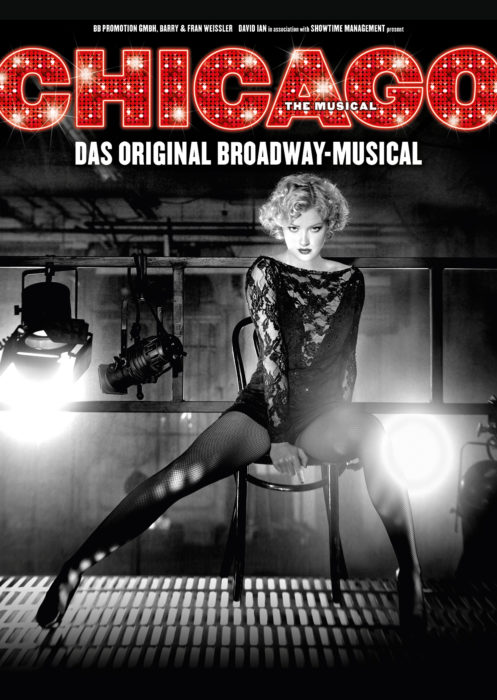
Chicago, années 20, "une histoire de meurtre, de cupidité, de corruption, de violence, de manipulation, d'adultère et de trahison". Le meurtre, c'est le moyen qu'ont choisi les héroïnes, Roxie Hart et Velma Kelly, pour accéder à la célébrité dans un monde où tuer est un art. La corruption, c'est ce qui caractérise Mama Morton, la gardienne de la prison où sont enfermées les héroïnes, même si elle préfère appeler son système la "réciprocité". La manipulation, c'est l'instrument préféré de Billy Flynn, la star des avocats que se disputent les meurtrières. Par son charisme et son éloquence, ce manipulateur-né séduit habilement ses clientes, déstabilise les témoins, hypnotise les journalistes et les jurés. L'adultère, la cupidité et la trahison sont autant de mobiles du crime, de sujets d'articles à sensation… ce sont aussi autant d'actes que subit passivement Amos, mari de Roxie, symbole du " pauvre type " qui ne maîtrise aucun événement. Quant à la violence, c'est celle des personnages et de leurs actes mais aussi celle des mots de cette comédie musicale subversive.
Acte I
In the mid 1920s in Chicago, Illinois, Velma Kelly is a vaudevillian who murdered both her husband and her sister when she found them in bed together. She welcomes the audience to tonight's show (All That Jazz ). Meanwhile, we hear of chorus girl Roxie Hart's murder of her lover, nightclub regular Fred Casely.
Roxie convinces her husband Amos that the victim was a burglar, and Amos cheerfully takes the blame. Roxie expresses her appreciation of her husband's thick skull (Funny Honey ). However, when the police mention the deceased's name Amos belatedly puts two and two together. The truth comes out, and Roxie is arrested. She is sent to the women's block in Cook County Jail, inhabited by Velma and other murderesses (Cell Block Tango). The block is presided over by the corrupt Matron "Mama" Morton, whose system of mutual aid (When You're Good to Mama) perfectly suits her clientele. She has helped Velma become the media's top murder-of-the-week and is acting as a booking agent for Velma's big return to vaudeville.
Velma is not happy to see Roxie, who is stealing not only her limelight but also her lawyer, Billy Flynn. Roxie tries to convince Amos to pay for Billy Flynn to be her lawyer (A Tap Dance). Eagerly awaited by his all-girl clientele, Billy sings his anthem, complete with a chorus of fan dancers (All I Care About is Love). Billy takes Roxie's case and re-arranges her story for consumption by sympathetic tabloid columnist Mary Sunshine (A Little Bit of Good). Roxie's press conference turns into a ventriloquist act with Billy dictating a new version of the truth (We Both Reached for the Gun) to the press while Roxie mouths the words.
Roxie becomes the new toast of Chicago and she proclaims so boastfully while planning for her future career in vaudeville (Roxie). As Roxie's fame grows, Velma's notoriety is left in the dust and in an "act of pure desperation", she tries to talk Roxie into recreating the sister act (I Can't Do It Alone), but Roxie turns her down, only to find her own headlines replaced by the latest sordid crime of passion. Separately, Roxie and Velma realize there's no one they can count on but themselves (My Own Best Friend), and the ever-resourceful Roxie decides that being pregnant in prison would put her back on the front page.
Acte II
Velma again welcomes the audience with the line "Hello, Suckers," another reference to Texas Guinan, who commonly greeted her patrons with the same phrase. She informs the audience of Roxie's continual run of luck (I Know a Girl) despite Roxie's obvious falsehoods (Me and My Baby). A little shy on the arithmetic, Amos proudly claims paternity, and still nobody notices him (Mr. Cellophane). Velma tries to show Billy all the tricks she's got planned for her trial (When Velma Takes The Stand). With her ego growing, Roxie has a heated argument with Billy, and fires him. She is brought back down to earth when she learns that a fellow inmate has been executed.
The trial date arrives, and Billy calms her, telling her if she makes a show of it, she'll be fine (Razzle Dazzle), but when he passes all Velma's ideas on to Roxie, she uses each one, down to the rhinestone shoe buckles, to the dismay of Mama and Velma (Class). As promised, Billy gets Roxie her acquittal but, just as the verdict is given, some even more sensational crime pulls the pack of press bloodhounds away, and Roxie's fleeting celebrity life is over. Billy leaves, done with the case. Amos stays with her, glad for his wife, but she then confesses that there isn't really a baby, making Amos finally leave her. Left in the dust, Roxie pulls herself up and extols the joys of life (Nowadays). She teams up with Velma in a new act, in which they dance and perform (Hot Honey Rag) until they are joined by the entire company (Finale).
Chicago est créée en 1975. La malchance veut que cette même année voit la naissance de la comédie musicale A Chorus Line dont le succès sans précédent fait de l'ombre à Chicago qui connaît cependant plus qu'un succès d'estime avec près de 900 représentations. Après une reprise dans un théâtre londonien en 1979, il faut attendre 1996 pour que le producteur et metteur en scène Walter Bobbie décide de remonter ce spectacle. Cette fois, le succès est au rendez-vous : Chicago fait un tabac à Broadway (six Tony Awards) puis à Londres en 1997 avec, dans les rôles principaux, Ruthie Henshall et Ute Lemper.
Depuis ce triomphe de 1996, il était question d'une adaptation cinématographique. Après un projet avorté avec, en tête de distribution, Madonna, Goldie Hawn et John Travolta et plusieurs années de tergiversations ayant vu se succéder les noms de Winona Ryder, Gwyneth Paltrow, Michelle Pfeiffer, Helen Hunt et bien d'autres, le film voit le jour en décembre 2002. La réalisation est confiée à Rob Marshall, dont c'est le premier long-métrage. Dans les rôles principaux, on retrouve Catherine Zeta-Jones (Le Masque de Zorro, Traffic), Rene Zellweger (Bridget Jones), Richard Gere, la prêtresse du hip-hop Queen Latifah. En ce qui concerne la bande-originale, on retrouve les chansons d'origine interprêtés par les acteurs eux-mêmes. En prime, on découvre, pour le générique, une nouvelle composition de Kander et Ebb, « I Move On ».
A un moment où la comédie musicale filmée n'est pas à son apogée, les pronostics concernant le succès public du long-métrage étaient fort mitigés. Et pourtant, quelques jours après sa sortie dans les salles américaines, Chicago se classe en tête du box-office et remporte trois Golden Globes (Meilleure comédie/comédie musicale - Meilleure actrice pour Rene Zellweger et Meilleur acteur pour Richard Gere).
1 Chicago peut-être considéré comme un Top musical
The musical Chicago is based on a play of the same name by reporter Maurine Dallas Watkins, who was assigned to cover the 1924 trials of murderesses Beulah Annan and Belva Gaertner for the Chicago Tribune.
Annan, the model for the character of Roxie Hart, was 23 when she was accused of the April 3, 1924, murder of Harry Kalstedt. The Tribune reported that Annan played the foxtrot record "Hula Lou" over and over for two hours before calling her husband to say she killed a man who "tried to make love to her". She was found "not guilty" on May 25, 1924. Velma is based on Gaertner, who was a cabaret singer. The body of Walter Law was discovered slumped over the steering wheel of Gaertner's abandoned car on March 12, 1924. Two police officers testified that they had seen a woman getting into the car and shortly thereafter heard gunshots. A bottle of gin and an automatic pistol were found on the floor of the car. Gaertner was acquitted on June 6, 1924. Lawyers William Scott Stewart and W. W. O'Brien were models for a composite character in Chicago, "Billy Flynn."
Watkins' sensational columns documenting these trials proved so popular that she decided to write a play based on them. The show received both popular and critical acclaim and even made it to Broadway in 1926, running for 172 performances. Cecil B. DeMille produced a silent film version, Chicago (1927), starring former Mack Sennett bathing beauty Phyllis Haver as Roxie Hart. It was later remade as Roxie Hart (1942) starring Ginger Rogers; but, in this version, Roxie was accused of murder without having really committed it.
In the 1960s, Gwen Verdon read the play and asked her husband, Bob Fosse, about the possibility of creating a musical adaptation. Fosse approached playwright Watkins numerous times to buy the rights, but she repeatedly declined. In her later years, Watkins had become a born-again Christian and believed her play glamorized a scandalous way of living. However, upon her death in 1969, her estate sold the rights to producer Richard Fryer, Verdon, and Fosse. John Kander and Fred Ebb began work on the musical score, modeling each number on a traditional vaudeville number or a vaudeville performer. This format made explicit the show's comparison between "justice", "show-business", and contemporary society. Ebb and Fosse penned the book of the musical, and Fosse also directed and choreographed.
According to Fred Ebb, he wrote the book in a vaudeville style because "the characters were performers. Every musical moment in the show was loosely modeled on someone else: Roxie was Helen Morgan, Velma was Texas Guinan, Billy Flynn was Ted Lewis, Mama Morton was Sophie Tucker." Kander elaborates that the reason the show was called a vaudeville "is because many of the songs we wrote are related to specific performers like those you mentioned, and Eddie Cantor and Bert Williams as well."
It was through the initial production, and not the writing, that many of the "traditional" Chicago staging conventions were developed:
The double snap in "Razzle Dazzle" was added as an afterthought at the suggestion of Fred Ebb to John Kander. Kander explains: "I remember when we wrote "Razzle Dazzle", before we took it in and played it for Bob, you [Ebb] said with absolute confidence 'Try adding a couple of finger snaps to it. Bobby will love that.' We added them...and as soon as he heard the finger snaps, he loved the song." During rehearsals, "Razzle Dazzle" was originally staged as an orgy on the steps of the courthouse. Fosse was talked out of allowing this staging, when Jerry Orbach "convinced him that he was missing the Brechtian subtlety intrinsic in the number."
The original finale was "Loopin' the Loop", a doubles act with Gwen Verdon and Chita Rivera; however, "the scene seemed too much like an amateur act so Fosse asked for something more 'glamorous in pretty gowns'". The piece was cut and replaced with "Nowadays". Sections of "Loopin' the Loop" can still be heard in the Overture.[7] Two other sections termed "Keep It Hot" and "RSVP" were cut from the finale as well.
Another principal character was played by David Rounds and known simply as "The Agent," whose role was to exploit the notoriety of the prisoners for his own gain. He also served as the evening's M.C. This character's role and the song "Ten Percent" was cut, with the character folded into that of Matron Mama Morton, and various members of the chorus shared his emcee duties.
In a reversal of roles, Fosse decided the lyrics to the number "Class" were too offensive and censored Kander and Ebb's original version of the song. One of the original lyrics "Every guy is a snot/Every girl is a twat" was restored for the 2002 movie, although the entire number was cut from the final release of the movie.
Original Broadway production
Chicago: A Musical Vaudeville opened on June 3, 1975 at the 46th Street Theatre, and ran for a total of 936 performances, closing on August 27, 1977. The opening night cast starred Chita Rivera as Velma Kelly, Gwen Verdon as Roxie Hart, Jerry Orbach as Billy Flynn and Barney Martin as Amos Hart. Velma Kelly had been a comparatively minor character in all versions of Chicago prior to the musical rendering. The role was fleshed out to balance Chita Rivera's role opposite Gwen Verdon's Roxie Hart.
The musical received mixed reviews. The Brechtian style of the show, which frequently dropped the fourth wall, made audiences uncomfortable. According to James Leve, "'Chicago' is cynical and subversive, exploiting American cultural mythologies in order to attack American celebrity culture."
The show opened the same year as Michael Bennett's highly successful A Chorus Line, which beat out Chicago in both ticket sales and at the Tony Awards. The show was on the verge of closing, when it ran into another setback: Gwen Verdon had to have surgery on nodes in her throat after inhaling a feather during the show's finale. The producers contemplated closing the show, but Liza Minnelli stepped in and offered to play the role of Roxie Hart in place of Verdon. Her run lasted a month, boosting the show's popularity, and Gwen Verdon recuperated and returned to the show. Later during the run, Ann Reinking, who would go on to star in the highly successful 1996 revival and choreograph that production in the style of Bob Fosse, was also a cast replacement for Roxie Hart during the show's original run.
1979 West End
The first West End, London production opened at the Cambridge Theatre in April 1979 and ran for around 600 performances.[16] It starred Jenny Logan as Velma Kelly and Antonia Ellis as Roxie Hart. Ellis (Actress of the Year in a Musical) and Ben Cross (Actor of the Year in a Musical) were nominated for the Olivier Award for their performances, and the musical was nominated as Musical of the Year.
1996 Broadway revival
City Center Encores! series presented Chicago in May 1996. The series had been previously used exclusively to bring attention to older, more obscure musicals that might have otherwise been forgotten. The production was directed by Walter Bobbie with choreography "in the style of Bob Fosse" by Ann Reinking, who also starred as Roxie Hart. Also in the show was Bebe Neuwirth as Velma Kelly, Joel Grey as Amos Hart and James Naughton as Billy Flynn. Performers were holding scripts and the choreography was sometimes unpolished. The show was well-received, with Howard Kissel, reviewing for the New York Daily News writing that "This 'Chicago' impressed me far more than the original.".[19] Ben Brantley, in his review for The New York Times, wrote " 'Make love to the audience' was another Fosse dictum. That's exactly what Ms. Reinking and her ensemble do. 'Chicago' can still seem glibly cynical and artificially cold, especially in its weaker second act. But these performers know just how to take off the chill." By May 10, 1996, there was talk of a Broadway production: "Down the block, there is a move afoot to move the Encores production of "Chicago" to Broadway. Rocco Landesman said that he and Fran and Barry Weissler wanted to bring the production to the Martin Beck Theater this summer."
Barry and Fran Weissler brought the concert version of Chicago, now titled Chicago: The Musical, directly to Broadway, where it opened on November 14, 1996, with a new script by David Thompson. The show set a record for recovering its initial costs faster than any other musical in history. This is likely due to the stripped down nature of the show: the set is nothing more than a giant bandstand, and the costumes are minimalist and black.
Unlike its predecessor Chicago: A Musical Vaudeville, Chicago: The Musical was met with praise from audiences and critics alike. Society had changed in light of events such as the O. J. Simpson murder case, and audiences were more receptive to the criminal-as-celebrity theme of the show.
Chicago: The Musical won six Tony Awards, more than any other revival in Broadway history until being beat out by South Pacific which won seven, winning for Best Revival of a Musical, Best Leading Actress in a Musical for Bebe Neuwirth, Best Leading Actor in a Musical for James Naughton, Best Lighting Design of a Musical for Ken Billington, Best Director of a Musical for Walter Bobbie and Best Choreography for Ann Reinking. While still married to Verdon, Fosse also romanced Reinking, who eventually took over the role of Roxie when Verdon left the show. Reinking reprised this role in the 1996 revival, when she was 46.
Chicago: The Musical has run for over 5,400 performances as of January 10, 2010 and holds the record for longest-running musical revival on Broadway. Chicago is currently the fourth longest-running Broadway show ever. During its run, the show has played in three Broadway theatres - the Richard Rodgers Theatre (the same theatre where the original 1975 production played, at the time called the 46th Street Theatre), the Shubert Theatre and the Ambassador Theatre. The Grammy Award winning cast recording of the revival was released on January 28, 1997. The show currently features Tony Yazbeck (Billy Flynn), Chris Sullivan (Amos), Carol Woods (Matron "Mama" Morton), Kara DioGuardi (Roxie), and Amra-Faye Wright (Velma). Among the many other performers and celebrities who have appeared in the show during its long run are Usher, Michael C. Hall, Jerry Springer, Brooke Shields, Kevin Richardson, Melora Hardin, Rita Wilson, Melanie Griffith, Taye Diggs, Chandra Wilson, John O'Hurley, Ashlee Simpson, Leigh Zimmerman[25], Samantha Harris, Marilu Henner, Jeff McCarthy, Christie Brinkley, and Sofía Vergara.
1997 London revival
On November 18, 1997, Chicago: The Musical opened in London's West End.[27][28] Like the New York revival, it is directed by Walter Bobbie and designed by John Lee Beatty, with choreography by Ann Reinking in the style of Bob Fosse. The show ran at the Adelphi Theatre for nine years until transferring to the Cambridge Theatre in April 2006.
The original cast of the production included German jazz singer, Ute Lemper as Velma, British actress Ruthie Henshall as Roxie Hart, Nigel Planer as Amos Hart and Henry Goodman as Billy Flynn. The production won the 1998 Olivier Award for Outstanding Musical, and Lemper was awarded Best Actress in a Musical. Both Ute Lemper and Ruthie Henshall have played the role of Velma Kelly on Broadway to great acclaim.
The London production, like its Broadway counterpart, has featured many acclaimed international celebrities and actors in the starring roles. For example, Marti Pellow, David Hasselhoff, John Barrowman, Tony Hadley, Jerry Springer, Kevin Richardson, and Ian Kelsey have all played the role of Billy Flynn since 2002. Maria Friedman, Josefina Gabrielle, Denise Van Outen, Claire Sweeney, Linzi Hateley, Frances Ruffelle, Jennifer Ellison, Jill Halfpenny, Brooke Shields, Sally Ann Triplett, Bonnie Langford, Tina Arena, Ashlee Simpson, Aoife Mulholland, Michelle Williams, and Christie Brinkley have all played Roxie Hart since 1998. Williams was the first African American woman to play the part of Roxie on the West End stage. There is also a professional touring cast of the musical.
The revival closed at the Cambridge Theatre on August 27, 2011 in its 14th year and will re-open at the Garrick Theatre on 7 November 2011, starring America Ferrera as Roxie.
Acte I
Overture-Orchestra
"All That Jazz" - Velma Kelly and Company
"Funny Honey" - Roxie Hart, Amos Hart and Sergeant Fogarty
"When You're Good to Mama" - Matron "Mama" Morton
"Cell Block Tango" - Velma and the Murdresses
"All I Care About" - Billy Flynn and the Girls
"A Little Bit of Good" - Mary Sunshine
"We Both Reached for the Gun" - Billy, Roxie, Mary and the Reporters
"Roxie" - Roxie and the Boys
"I Can't Do It Alone" - Velma
"My Own Best Friend" - Roxie and Velma
Acte II
Entracte-Orchestra
"I Know a Girl"- Velma
"Me and My Baby" - Roxie and Company
"Mr. Cellophane" - Amos
"When Velma Takes the Stand" - Velma and the Boys
"Razzle Dazzle" - Billy and Company
"Class" - Velma and Mama Morton
"Nowadays" - Velma and Roxie
"Hot Honey Rag" - Velma and Roxie
"Finale" - Company
Velma Kelly - A vaudevillian and murderess who is on trial for killing her cheating husband and sister. She is represented by Billy Flynn and competes with Roxie Hart over him.
Roxanne "Roxie" Hart - A wannabe vaudevillian and murderess who kills her ex-boyfriend after a spat and is sent to jail.
William "Billy" Flynn - Velma and Roxie's lawyer who has a perfect track record and makes celebrities of his clients to win sympathy and sway public opinion.
Amos Hart - Roxie's faithful and good-natured, but simple husband whom nobody pays attention to. He spends most of the play trying to make Roxie take interest in him or even just acknowledge his existence.
Matron "Mama" Morton - The matron of the Cook County Jail who believes that all favors she gives should be reciprocated.
Mary Sunshine - The newspaper reporter who follows the trials of both Roxie Hart and Velma Kelly. In most productions, Sunshine is revealed to be a male at the end of the show.
Aucun dossier informatif complémentaire concernant Chicago
Aucun dossier informatif complémentaire concernant Chicago

Version 1
Chicago (1975-04-Forrest Theatre-Philadelphia)
Type de série: Pre-Broadway Try OutThéâtre: Forrest Theatre (Philadelphia - Etats-Unis) Durée : 3 semaines Nombre : Première Preview : 08 April 1975
Première: 08 April 1975
Dernière: 03 May 1975Mise en scène : Bob Fosse • Chorégraphie : Bob Fosse • Producteur : Star(s) :
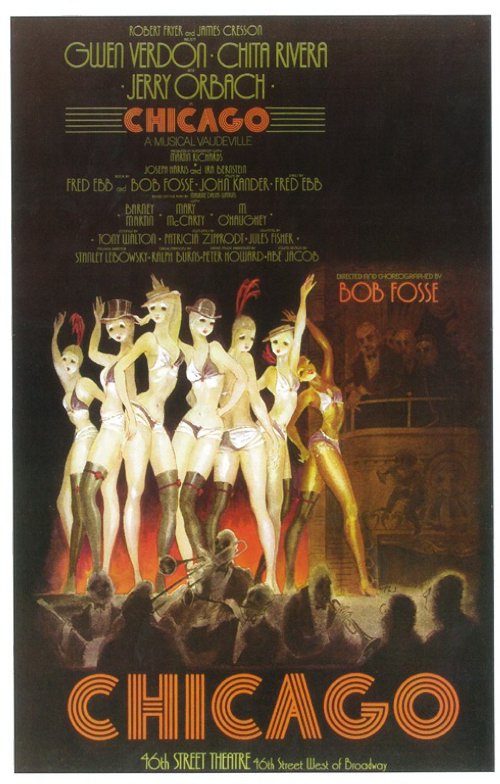
Version 2
Chicago (1975-06-Richard Rodger's Theatre-Broadway)
Type de série: OriginalThéâtre: Richard Rodgers Theatre (Broadway - Etats-Unis) Durée : 2 ans 2 mois 3 semaines Nombre : 25 previews - 936 représentationsPremière Preview : 12 May 1975
Première: 03 June 1975
Dernière: 27 August 1977Mise en scène : Bob Fosse • Chorégraphie : Bob Fosse • Producteur : Star(s) : Avec: Roxie Hart … Gwen Verdon
Billy Flynn … Jerry Orbach
Velma Kelly … Chita Rivera
Amos Hart … Barney Martin
Matron "Mama" Morton … Mary McCarty
Mary Sunshine … M. O'Haughey
Fred Casely … Christopher ChadmanCommentaires longs: At some point prior to the Broadway opening, the role of theatrical agent Henry Glassman (played by David Rounds) was cut from the show. Some of his function as a character was then given to Matron Mama Morton. Although some reports have suggested that he was cut from the show prior to the beginning of Broadway previews, the character and his song, "Ten Percent," are listed in playbills from the beginning of Broadway previews so the role may not have been cut until during Broadway previews.
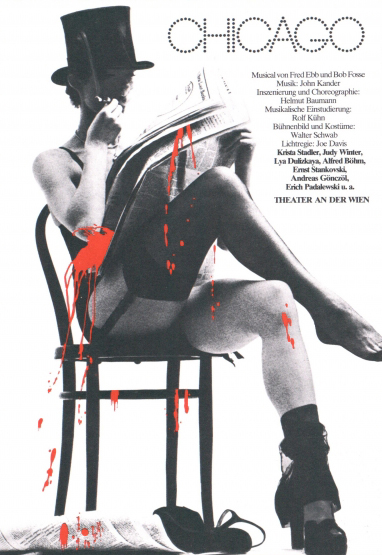
Version 3
Chicago (1979-02-Theater an der Wien-Vienne)
Type de série: RevivalThéâtre: Theater an der Wien (Vienne - Autriche) Durée : Nombre : 124 représentationsPremière Preview : 21 February 1979
Première: 21 February 1979
Dernière: InconnuMise en scène : Helmut Baumann • Chorégraphie : Helmut Baumann • Producteur : Star(s) :
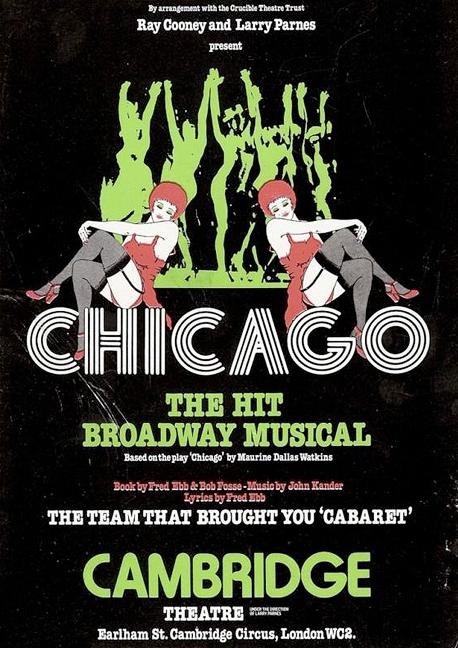
Version 4
Chicago (1979-04-Cambridge Theatre-London)
Type de série: Original LondonThéâtre: Cambridge Theatre (Londres - Angleterre) Durée : Nombre : 600 représentationsPremière Preview : Inconnu
Première: 10 April 1979
Dernière: InconnuMise en scène : Peter James • Chorégraphie : Gillian Gregory • Producteur : Star(s) : Avec: Antonia Ellis (Roxie Hart), Jenny Logan (Velma Kelly), Don Fellows (Amos Hart), Hope Jackman (Momma Morton), Ben Cross (Billy Flynn), G.Lyons (Mary Sunsine)Commentaires : Based on the 1926 play by Maurine Dallas Watkins’ and its subsequent film starring Ginger Rogers, the 1975 Broadway musical starred Gwen Verdon and Chita Rivera. Shortly after the New York opening Gwen Verdon was taken ill and temporarily replaced with Liza Minelli. The London production originated at the Crucible Theatre, Sheffield in November 1978.
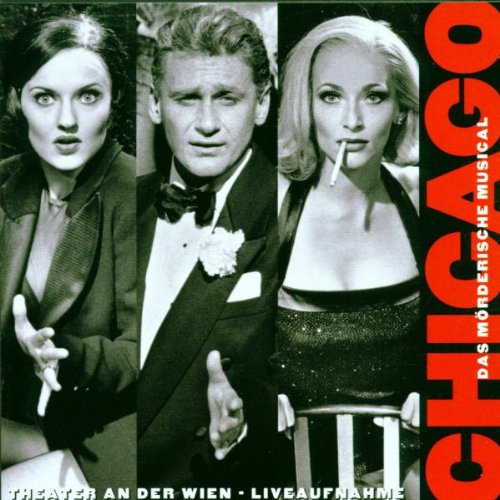
Version 5
Chicago (1998-09-Theater an der Wien-Vienne)
Type de série: RevivalThéâtre: Theater an der Wien (Vienne - Autriche) Durée : 7 mois Nombre : 201 représentationsPremière Preview : 23 September 1998
Première: 23 September 1998
Dernière: 21 April 1999Mise en scène : Walter Bobbie • Chorégraphie : Ann Reinking • Producteur : Star(s) : Commentaires : Sera transféré au Ronacher Theater
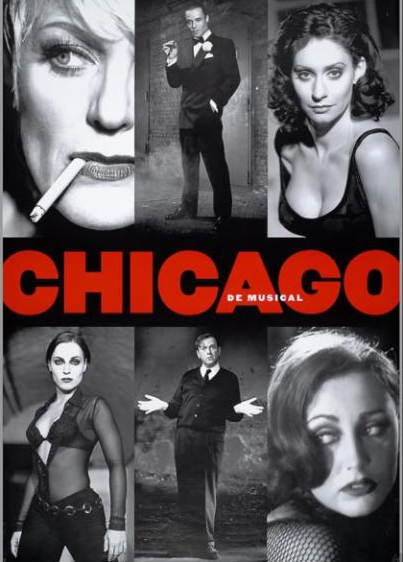
Version 6
Chicago (1999-05-Beatrix Theater-Utrecht)
Type de série: RevivalThéâtre: Beatrix Theater (Utrecht - Pays-Bas) Durée : 1 an 8 mois 3 semaines Nombre : Première Preview : 09 May 1999
Première: 09 May 1999
Dernière: 28 January 2001Mise en scène : Chorégraphie : Producteur : Star(s) : Avec: Roxie Hart: Simone Kleinsma, Ellen Evers / Velma Kelly: Pia Douwes, Sophia Wezer / Billy Flinn: Stanley Burleson, Tony Neef, Danny Rook / Mamma Morton: Marjolijn Touw, Jenny Arean / Amos Hart: Serge-Henri Valcke / Mary Sunshine: Michael Diederich
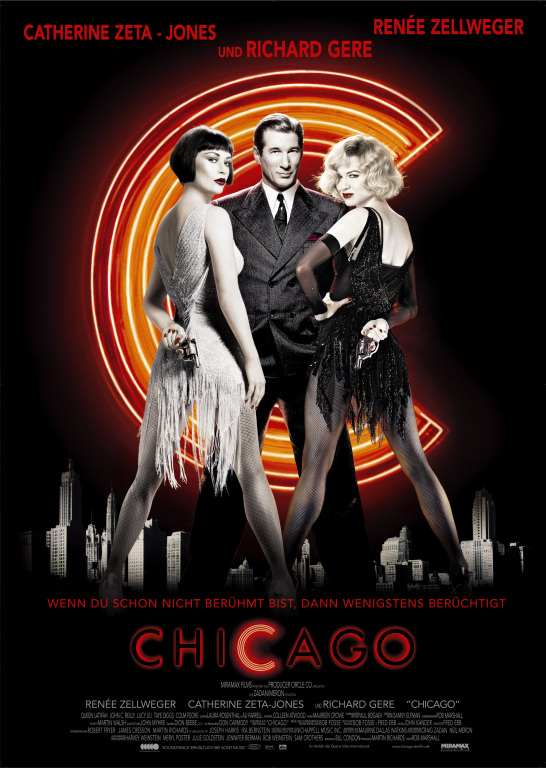
Version 7
Chicago (2002-12-Film)
Type de série: FilmThéâtre: *** Film (*** - ***) Durée : Nombre : Première Preview : 27 December 2002
Première: 27 December 2002
Dernière: 27 December 2002Mise en scène : Rob Marshall • Chorégraphie : ???? ???? • Producteur : Star(s) : Avec: Roxie Hart … Renée Zellweger
Velma Kelly … Catherine Zeta-Jones
Billy Flynn … Richard Gere
Matron Mama Morton … Queen Latifah
Amos Hart … John C. Reilly
Bandleader … Taye Diggs
Fred Casely … Dominic West
Mary Sunshine … Christine Baranski
Mrs. Borusewicz … Jayne Eastwood
Nickie … Chita Rivera
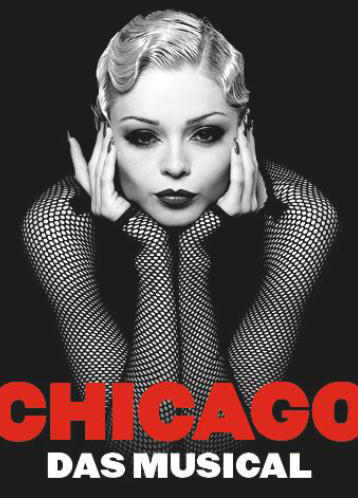
Version 9
Chicago (2014-11-Palladium Theater-Stuttgart)
Type de série: RevivalThéâtre: Palladium Theater (Stuttgart - Allemagne) Durée : 11 mois Nombre : Première Preview : 06 November 2014
Première: 06 November 2014
Dernière: 04 October 2015Mise en scène : Chorégraphie : Producteur : Star(s) : Avec: Volker Metzger (Amos Hart), Nigel Casey (Billy Flynn), Isabel Dörfler ("Mama" Morton), M. Schäffner (Mary Sunshine), Carien Keizer (Roxie Hart), Lana Gordon (Velma Kelly)
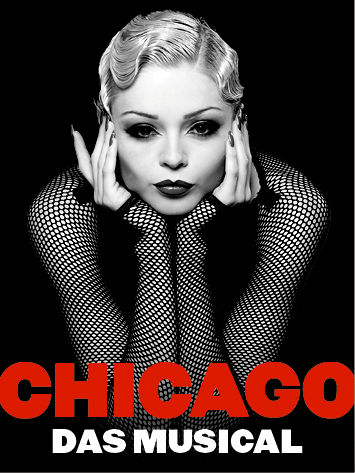
Version 10
Chicago (2015-10-Theater des Westens-Berlin)
Type de série: RevivalThéâtre: Theater des Westens (Berlin - Allemagne) Durée : 3 mois 1 semaine Nombre : Première Preview : 11 October 2015
Première: 11 October 2015
Dernière: 17 January 2016Mise en scène : Chorégraphie : Ann Reinking • Producteur : Star(s) : Avec: Volker Metzger (Amos Hart), Nigel Casey (Billy Flynn), Isabel Dörfler (Mama' Morton), Carien Keizer (Roxie Hart), Caroline Frank (Velma Kelly)
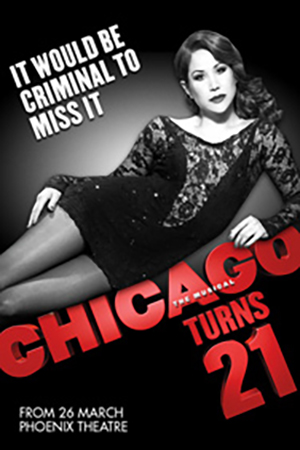
Version 11
Chicago (2018-04-Phoenix Theatre-London)
Type de série: RevivalThéâtre: Phoenix Theatre (Londres - Angleterre) Durée : 8 mois 4 semaines Nombre : Première Preview : 26 March 2018
Première: 11 April 2018
Dernière: 05 January 2019Mise en scène : Chorégraphie : Producteur : Star(s) : Avec: Cuba Gooding Jr (Billy Flynn), Sarah Soetaert (Roxie), Josefina Gabrielle (Velma), Ruthie Henshall (Mama Morton), Paul Rider (Amos Hart), Alan Richardson, Michelle Antrobus, Natalie Bennyworth, Nicola Coates, Frances Dee, Zoe Gappy, Emma Harris, Chelsea Labadini, Joanna Rennie, Abramo Ciullo, Francis Foreman, Luke Jarvis, Matt Krzan, Charles Ruhrmund, Todd Talbot, Callum Macdonald, Chris Warner Drake, Matthew Wesley.Commentaires : After a hugely successful tours across the UK and internationally, smash-hit American musical Chicago returns to the London stage, starring Academy Award-winning actor Cuba Gooding Jr as Billy Flynn. Last seen at the Garrick Theatre in 2012, the production returns to the Phoenix Theatre in March 2018, celebrating its 21st anniversary as the longest-running musical on Broadway.
Pas encore de video disponible pour ce spectacle

.png)
.png)





